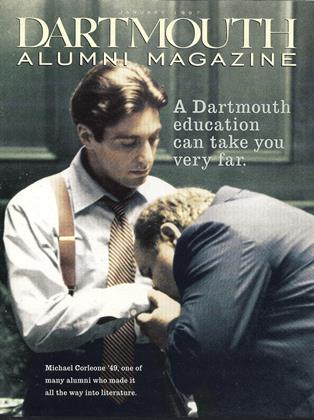Crows Over a Wheatfield (Hyperion), by Paula Sharp '79. is a novel of domestic affairs, a mystery, a thriller, and an activist fantasy rolled into one. Sharp's novel, her third, is also a study of how people confront evil. Two families are torn apart by violence, while the courts support the outwardly/respectable abusers. "We are fighting the devil, and the devil is the law," says the novel's heroine, Mildred Steck
Sharp, a criminal lawyer, expertly reveals how laws can be manipulated by abusive husbands and egotistical attorneys. She gives us astute portraits of several such devils, including trial lawyer Joel Ratleer, as brilliantly cruel to his family as he is to opponents. Mildred Steck's personal descent into the hell of domestic violence and custody law prompts her to create an underground railroad for battered women and their children. Just as Edward Abbey's fictional monkey wrench gang inspired a generation of eco-activists, Crows Over a Wheatfield could ignite a similar movement against domestic violence.
E merging from time to time as a Socio-cultural theme for a novel is the apocryphal myth of the "Illuminati"—the notion that there exists a certain secret group of intellectuals, military men, scientists, business men, and politicians who run the world to their own selfish advantage. Gentlemen of Decision by J.J. Stein '66 (Hero's Path Productions) is a crackerjack example of the genre. A computer-whiz betrays the group, in the midst of a nation-shaking cri sis, to save his own family from destruction. Stein has done time in Hollywood, teaches film, and knows how to plot a thriller.
Phil Silverman '85 and Bob Waldstein are two hopelessly nutty football fails who toured the nation in a second-hand hearse and observed the idiosyncrasies of the nation's most bitter football rivalries. Their book, Saturday Afternoon Madness (Four Horsemen Press), isn't the view from the stands so much as the scene in the bars, the fraternity houses, the broadcast booths, the tailgate parking lots, and the locker rooms. There is scant mention of the Ivy League, but on campuses from Clemson and Tuscaloosa to Ann Arbor and Seattle the authors recount the local legends and traditions, the greatest upsets, the leading party schools, the loudest stadiums, the best food, the oft-censored band shows, the ten most inspiring fight songs—you name it. And you'll love it.
Peter Richmond isn't an alum, but his father was Tom Richmond '30. subject of My Father's War: ASon's Journey (Simon & Schuster). Tom, a company commander in the First Marine Division from 1942 to 1945, returned from Guadalcanal to a modest suburban business life, only to die in an air crash in 1960, when Peter was seven. Peter sensed as he grew older that beyond the war trophies in the attic there must have been a more "dramatic story. And indeed he found it, among Marine documents and official battle accounts, in the ready m emories of Tom Richmond's fellow officers, and in his actual visits to Bloody Ridge, the Matanikau, New Britain, and horror-laden Peliliu. One account after another reveals a figure of unusual courage, quiet heroism, and sincere devotion from comrades in arms.
 View Full Issue
View Full Issue
More From This Issue
-
 Feature
FeatureWhatever Happened to the Dartmouth Review?
January 1997 By Michael Cannell -
 Cover Story
Cover StoryA Bunch Of Characters
January 1997 By Jane Hodges ’92 -
 Feature
FeatureTo the North
January 1997 By Regina Barreca ’79 -
 Class Notes
Class Notes1952
January 1997 By Henry Williams -
 Article
ArticleStill on the Freedom Trail
January 1997 By Christopher Kenneally ’81 -
 Article
ArticleFootball Gains Perfection While Michigan Gains a President
January 1997 By “E. Wheelock”







